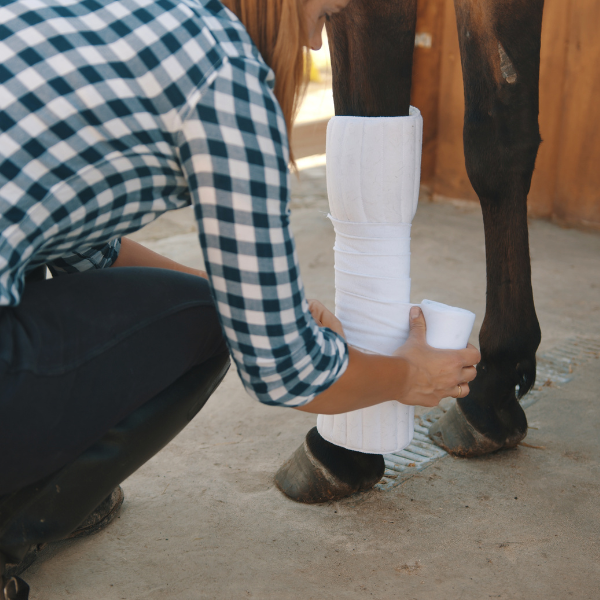Joint health is probably on mid-south equestrians’ minds as we find ourselves in the middle of show season. With all the variables that come into play while preparing for a show, one most horse owners and riders focus on is keeping their equines sound.
Dr. Mark Akin, DVM, advises equestrians to exercise this basic rule of thumb when it comes to joint health: “Know what is normal for your horse.” He states all horses cannot be expected to have the same anatomy. Certain bumps, lumps, and swellings can be normal for some horses- perhaps indications of a previous injury. However, being able to convey your horse’s “normal” to your veterinarian, farrier, or trainer is of utmost importance, according to Dr. Akin.
Being proactive in your horse’s care is another way to hopefully keep your horse sound throughout the show season. One way to do this, as Dr. Akin suggests, is schedule a performance exam with your veterinarian every four to six months, “just to stay on top of any existing issues and get in front of any potential issues that may be brewing.” This allows the owner and, if possible, the trainer to discuss any specific issues or concerns with the vet. Past exam findings can be compared with the current, and all the “check engine lights,” as Dr. Akin calls them, can be proactively examined. These include “abnormalities in flexions, palpations, or locomotion,” Dr. Akin states.
Arena footing can also be a concern when it comes to joint health. “Different disciplines require different footings,” Dr. Akin says. “Cutting horses like it deeper. Hunters like it firmer. Reiners and Barrel Horses are somewhere in between,” he explains. However, regardless of what discipline you show in, “footing too deep or too muddy can lead to a number of soft tissue issues,” according to Dr. Akin.
What warrants a call to the veterinarian this show season? Lameness that does not go away with rest after two to three days, according to Dr. Akin, while “non-weight bearing lameness is an emergency.” If an issue arises at a show, Dr. Akin advises you to speak with the show vet if needed, however, keep in mind “a thorough performance exam is best done at home, not the show.”
As far as supplements for general soundness throughout the show season goes, Dr. Akin typically does not recommend a lot; however, if an equine athlete has a specific issue there may be supplements to help. For equines who need a joint supplement, his favorite is Adequan- a seven-dose series every six months. Being a systemic medication, Adequan, and others in this class, “aid in not only protecting cartilage but stimulating new cartilage growth.”
For horses with early onset arthritis, Dr. Akin recommends serial radiographs at 4-6 month intervals to monitor its progression. He uses multiple preventative measures with a plethora of treatments when it comes to arthritis. An Orthobiologic or Polyacrylamide Gel allows Dr. Akin “to not only ease discomfort in the joint, but to achieve this without the use of steroids, which offer short term relief but can eventually lead to cartilage breakdown when not used appropriately.” Non-steroidal anti-inflammatory drugs, or NSAIDs, play a role in acute joint trauma and, when used properly, can also decrease the acute onset of degenerative arthritis, according to Dr. Akin.
For equine drug tests this show season, different breeds will fall under specific drug rules. Dr. Akin advises you to check with your horse’s breed organization or contact USEF, FEI, AQHA, etc. A wise equestrian is familiar with equine drug testing rules.
When it comes to keeping your horse’s joints healthy this show season, Dr. Akin urges you to contact your veterinarian “if something just doesn’t feel right.” He suggests videoing the concern if possible and sending it to the vet- he or she “will appreciate being able to see exactly what you are seeing pre-visit,” he states. A watchful eye on your part combined with proactive care from both the veterinarian and farrier can help keep your horse sound throughout show season.










